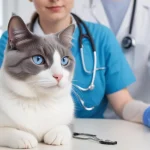
Purr-fect Care: Discovering Top Cat Boarding Near You
Cats Geek
Are you a feline parent in need of a reliable and comfortable boarding solution for your beloved kitty? Look no ...

What to Do About Hairballs in Cats
Cats Geek
No two ways about it: Hairballs in cats are unpleasant. And they’re not just disagreeable for the person who has to clean ...






